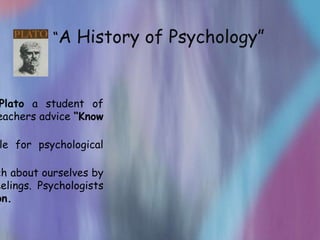
A history of psychology section 3
- 1. “A History of Psychology” Plato a student of eachers advice “Know le for psychological ch about ourselves by eelings. Psychologists on.
- 2. Another Greek philosopher Aristotle, raised many questions about behavior. One of Aristotle´s work was the “Peri Psyches”, which means about the mind. It is said that this book was written more than 2000 years ago, it describes how people are motivated to seek pleasure and to avoid pain, Peri Psyches also explores topics such as sensation, perception, thought, intelligence, needs, motives, feelings, emotions and memory.
- 3. The ancient greeks also theorized about psychological problems such as confusion and strange behavior, they attributed these disorders to supernatural forces, they believed that the gods punished people for their wrongdoing by causing them confusion and madness. However a Greek physician Hippocrates (c.460-c. 377B.C.), suggested that such problems were caused by abnormalities in the brain, this idea that biological factors can affect our thoughts, feelings and behavior influenced thinking about psychology ever since.
- 4. The Middle Ages • During the middle ages, most Europeans believed that problems such as agitation and confusion were signs of demonic possession. • Several tests were use to determine whether a person was possessed or not. • For example: The water-float test, people were thrown into deep water, if they manage to stay above the water, they were executed and treated as possesed, if not, they drowned, and were treated as pure souls.
- 5. “The Birth of a Modern Science” • Psychology was born as a modern science, when psychologists opened psychological laboraties. • In these laboratories, phsychologists studied behavior and mental processes, most historians point out to the year 1879 as the beginning of psychology as a modern laboratory science. One of these psychologists was Wilhelm Wundt (1832-1920), Wilhelm Wundt created the first psychology lab, and establish psychology as a science.
- 6. Wilhem Wundt Wilhem Wundt and his students, founded a field of psychology that came to be known as “Structuralism”, they were concerned with studying the basic elements of consciousness. Wunt broke down the content of consciousness into two categories: Objective sensations and Subjective feelings. Objective sensations such as sight and taste were assumed to reflect the outside world. Subjective feelings were thought to include emotional responses and mental images.
- 7. Objective Sensations Subjective Feelings
- 8. William James A decade after Wundt established his laboratory, William James (1842-1910), thought that consciousness experience cannot be broken down as structuralists believed, he said that experience is a continous stream of consciousness. William James was one of the founders of the school of Functionalism, they were concerned with how mental processes help organisms adapt to their environment. They believed behaviors were adaptive because they were successful, less adaptive behaviors were dropped or discontinued. If a behavior was successful, after lots of practice it can become a habit (automatic behavior).
- 9. John B. Watson Behaviorism: John B. Watson (1878-1958) Behaviorists believe behavior can be studied in a methodical and recognizable manner with no consideration of internal mental states. Watson believed that it was unscientific to study consciousness as a private event , he asserted that if psychology was to be a natural science, it must be observable and measured. As a founder of the school of behaviorism, Watson defined psychology as the scientific study of observable behavior.
- 10. B. F. Skinner B. F. Skinner (1904-1990) he added to the behaviorist tradition reinforcement. Skinner showed that when an animal is reinforced, or rewarded, for perfoming an action, it is more likely to perform the action in the future. According to Skinner people learn the same way animals do. Like animals people behave in certain ways because they have been reinforced for doing so.
- 11. The Gestalt School The psychology of Gestalt which means shape or form in German, is based on the idea that perceptions are more than the sums of their parts, rather they are wholes that give shape or meaning.
- 12. Sigmund Freud and the School of Psychoanalysis Sigmund Freud (1856-1939), was one of the most famous of the early psychologists. The school of thought that he founded was called “Psychoanalysis”, it emphasizes the importance of unconscious motives and internal conflicts and how they can influence behavior. Freud´s theory, more than others has become a part of popular culture, for example when you are trying to interpret a slip of the tongue, or when you try to figure out a dream.
- 13. • Structuralists, functionalists, behaviorists and Gestalt psychologists all conducted their research in a laboratory. However Freud gained his understanding of human behavior through consultations with patients. • Freud´s theory which is sometimes called “Psychodynamic Thinking”, assumed that most of what exists in a person´s mind is unconscious and makes us deal with conflicting impulses, urges and wishes. According to Freud, we are constantly trying to satisfy these desires, even though some of them might seem inappropriate or unacceptable in our society. Freud attempted to help people gain insight into their unconscious conflicts and find socially acceptable ways of expressing their wishes and meeting their needs.
- 14. Section Review What are the roots of psychology What does “Know Thyself” means? What is “Peri Psyches” about? Which Greek physician said that psychological problems were caused by abnormalities of the brain? According to the middle ages, what was the cause of psychological problems?
- 15. When was psychology a modern science? What is structuralism about? What is functionalism about? What do behaviorists believed? What is the Gestalt School about? What is the school of Psychodynamic about?